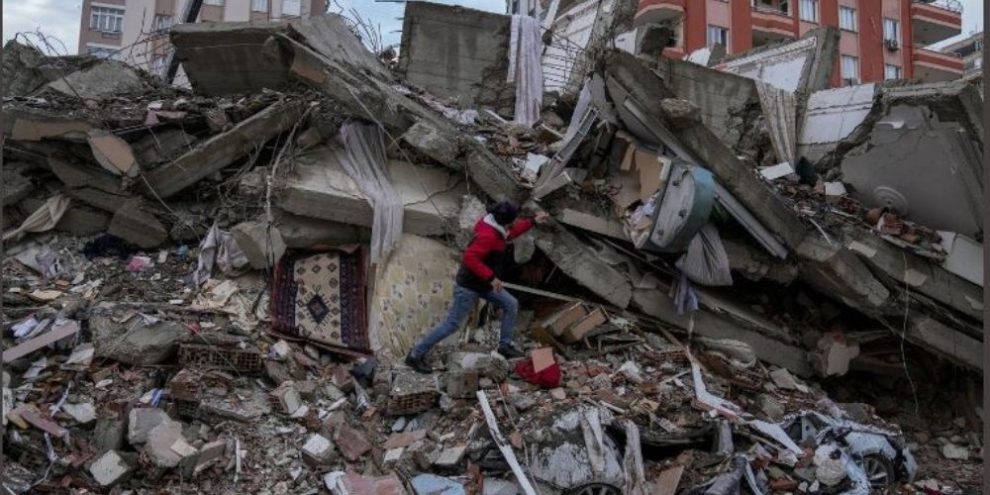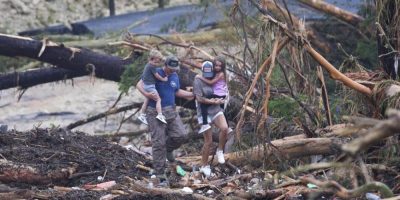
By Maan Alhmidi and Sharif Hassan
Canada is ready to provide help in the aftermath of a disastrous earthquake that hit Turkey and Syria, Prime Minister Justin Trudeau said Monday, as authorities in those countries reported that more than 3,400 people had died and thousands more were injured.
Rescue workers and residents searched the rubble of toppled buildings for survivors and officials feared the death toll would keep climbing.
Residents immediately rushed outside in rain and snow to escape falling debris, while those who were trapped cried for help. Throughout the day, major aftershocks hit the region, including one nearly as strong as the initial quake. After night fell, workers were still pulling out bodies as desperate families waited for news on trapped loved ones.
Trudeau said earlier Monday that the reports and images from Turkey and Syria were "devastating."
"Canada stands ready to provide assistance," he wrote in a statement. "Our thoughts are with everyone affected by these major earthquakes, and our hearts go out to those who lost loved ones."
Global Affairs Canada did not immediately respond to requests for comment about whether any Canadians were affected in Turkey and Syria.
The federal Conservatives would support "any effort by Canadians and the Canadian government to provide assistance," Conservative foreign affairs critic MP Michael Chong said in a tweet.
NDP foreign affairs critic MP Heather McPherson urged the federal government to send immediate humanitarian support.
The quake, which was centred on Turkey's southeastern province of Kahramanmaras, piled more misery on a region shaped on both sides of the border by more than a decade of civil war in Syria.
Thousands of buildings were reported collapsed in a wide area extending from Syria's cities of Aleppo and Hama to Turkey's Diyarbakir, more than 330 kilometres to the northeast.
Moutaz Adham, the Syria country director for Oxfam Canada, said the number of people killed and injured by the quake in Syria was shifting rapidly.
"We are seeing families are looking for their missing loved ones who (are) left under the debris of collapsed buildings. We know that people, even those that their buildings haven’t collapsed, don’t feel safe to go back,” he said in a phone interview from Damascus.
"The earthquake is coming on top of a very dire humanitarian situation in Syria."
Adham said there was a need for financial aid to help respond to the situation, noting that the quake also came during a harsh winter that could complicate relief efforts.
Majd Khalaf, a Montreal-based coordinator with the White Helmets — a Syrian civil-defence organization — said many buildings that collapsed were already damaged during the ongoing war, making them more vulnerable to the quake.
"Our teams are now responding … They are digging in the rubble to save lives," he said. "It's really a huge disaster."
Vast areas in northwest Syria have lost power and internet connections due to the quake, he added.
He said his organization is calling on the international community for immediate support with equipment to help in the rescue efforts.
"There are four million refugees (in Syria) near the Turkish border which made the situation more difficult for the White Helmets to evacuate, to respond," he said. "They live in camps in terrible conditions, especially in the winter."
Khaled Abdulwahed, a Toronto-based manager with Molham Volunteering Team — a non-profit organization that provides aid to displaced people in Syria — said his organization started an urgent fundraising campaign to support those who lost their homes due to the earthquake.
He said there is a high demand for essentials, including food, infant formula, heaters and blankets for people who are sheltering now in schools, sport centres and mosques.
"Our teams are also supporting hospitals and medical centres with medical supplies," he said. "We are trying to help those who lost their homes and now are living in temporary shelters."
The United Nations estimates that some 6.9 million people are internally displaced inside Syria due to the war.
The U.S. Geological Survey measured Monday’s quake at 7.8, with a depth of 18 kilometres. Hours later, a 7.5 magnitude quake struck more than 100 kilometres away. The second jolt was considered an aftershock because it took place on the same fault line as the first, according to a USGS seismologist.
The region in Turkey hit by the earthquake sits on top of major fault lines and is frequently shaken by earthquakes. Some 18,000 people were killed in similarly powerful earthquakes that hit northwest Turkey in 1999.
Offers of help, from search-and-rescue teams to medical supplies and money, have poured in from dozens of countries, as well as the European Union and NATO. The vast majority were for Turkey, with Russian and Israeli promises of help to the Syrian government, but it was not clear if any would go to the devastated rebel-held pocket in the northwest.
— With files from Jordan Omstead and The Associated Press
Banner image: A man walks among rubble as he searches for people in a destroyed building in Adana, Turkey, Monday, Feb. 6, 2023. THE CANADIAN PRESS/</i>AP/Khalil
This report by The Canadian Press was first published Feb. 6, 2023.





